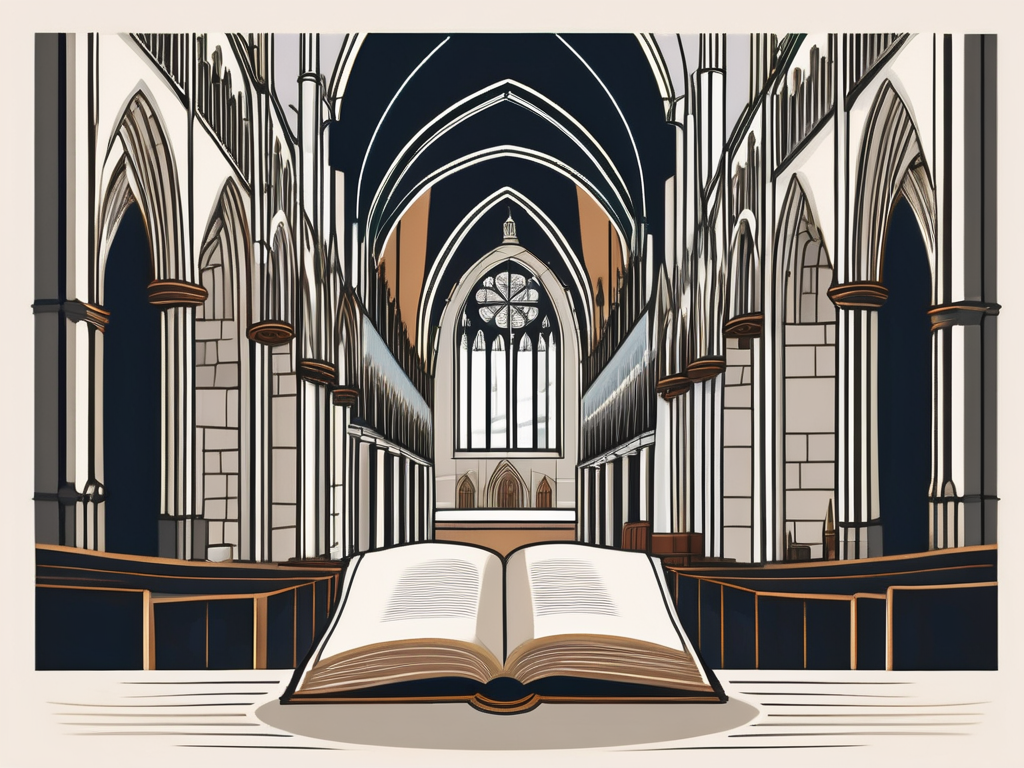The Quaker Christian faith is a rich and vibrant tradition that is worth exploring. In this comprehensive guide, we will delve into the various aspects of Quaker beliefs, practices, and its impact on contemporary society. Whether you are new to Quakerism or a long-time follower, this article aims to provide you with a deeper understanding of this unique spiritual path.
Understanding the Quaker Faith
Before we dive into the specifics, let’s take a moment to understand the essence of Quakerism. Quakerism, also known as the Religious Society of Friends, traces its roots back to 17th-century England. It was founded by George Fox, who sought a direct, personal experience with God. Today, Quakers can be found in various parts of the world and have diverse interpretations of their faith.
The Quaker faith is a rich tapestry of history, beliefs, and practices that have evolved over centuries. To truly appreciate Quakerism, it is essential to explore the history and origins of this faith. Quakerism emerged during a time of religious upheaval in England, when established churches held considerable power. Quakers, however, rejected hierarchical structures and emphasized the inner light of God within each individual.
Quaker beliefs were considered radical in their early years, leading to persecution, imprisonment, and even martyrdom for many Quakers. Despite the challenges, the movement grew and spread globally, with notable Quakers such as William Penn playing a crucial role in shaping the United States.
Quaker Christianity is centered on several core beliefs that form the foundation of the faith. One central concept is the belief in the “Inner Light,” which refers to the presence of divine guidance within every person. Quakers believe that anyone can directly commune with God without the need for intermediaries, such as clergy or rituals.
Another core belief of Quakerism is the peace testimony. Quakers strive to live in harmony with others and promote nonviolence in all aspects of life. This commitment to peace is deeply rooted in their understanding of the essential worth and divinity of every human being.
Quaker worship is distinct from other Christian traditions. Instead of following a structured liturgy, Quakers gather in silence, with the expectation that God’s presence and guidance will be felt among them. During these silent meetings, individuals may feel moved to vocalize their insights or share a message. This unprogrammed worship allows for spontaneity and communal connection.
In addition to worship, Quakers also engage in various spiritual practices. These include prayer, meditation, and the reading of inspirational texts. Quakers value simplicity in their lifestyle and often seek to live in harmony with nature and the environment.
Quakerism is a faith that continues to evolve and adapt to the changing times. Quakers today are actively involved in social justice movements, advocating for equality, peace, and environmental sustainability. Their commitment to living out their faith in the world is a testament to the enduring relevance of Quaker principles.
The Quaker Perspective on God
At the heart of Quaker beliefs is a unique understanding of God. Quakers acknowledge the diversity of religious experiences and encourage individuals to develop their own relationship with the divine.
Quakers believe that the concept of God is deeply personal and can vary from person to person. This belief stems from the Quaker principle of direct revelation, which holds that individuals can have direct access to the divine without the need for intermediaries such as priests or religious texts.
The Quaker perspective on God is often described as non-dogmatic and inclusive. Quakers recognize that different people have different experiences and interpretations of the divine, and they value the diversity of these perspectives.
The Inner Light Concept
The concept of the Inner Light lies at the core of Quaker spirituality. Quakers believe that every person has a direct connection to God, and this divine spark guides them in their lives. This concept emphasizes the equality of all individuals, as everyone is seen as a vessel for God’s presence.
Quakers often describe the experience of the Inner Light as a deep sense of peace, truth, and love. It is a source of wisdom and guidance that can be accessed through silence and inward reflection.
When Quakers gather for worship, they often sit in silence, waiting for the Inner Light to speak to them. This practice, known as “silent worship,” allows individuals to listen to the promptings of the divine and share any messages or insights that arise.
The Inner Light is not limited to Quakers alone. Quakers believe that all people, regardless of their religious or spiritual background, have the potential to connect with the divine within themselves.
Quaker Views on the Trinity
Quakers have diverse perspectives on the traditional concept of the Trinity. While some Quakers interpret it in a traditional manner, others see it as a metaphorical representation of various aspects of God. Quakerism encourages individuals to explore their own understanding of the divine and find meaning that resonates with their spiritual journey.
For those who interpret the Trinity metaphorically, it may represent different manifestations or expressions of the divine. Some Quakers view the Father, Son, and Holy Spirit as symbolic representations of different qualities or attributes of God, such as love, wisdom, and power.
Quakerism values the exploration of different theological ideas and encourages individuals to question and challenge traditional beliefs. This open-mindedness allows for a rich and diverse understanding of God within the Quaker community.
Ultimately, the Quaker perspective on God is one of personal experience and ongoing revelation. Quakers believe that the divine is not confined to any particular doctrine or religious tradition, but rather is present and accessible to all who seek a deeper connection with the sacred.
Quakerism and the Bible
The Bible holds a significant place within Quaker tradition, but its interpretation and role differ from other Christian denominations.
Quakers approach the Bible with an open and individualistic perspective. Rather than viewing it as an infallible, literal text, Quakers seek to discern the spirit and message behind the words. They believe that divine revelation is not limited to ancient texts but can be experienced in the present moment.
Quakers emphasize the importance of personal revelation and encourage individuals to listen to the Inner Light when engaging with the scriptures. This approach fosters a dynamic and evolving understanding of God’s message.
When Quakers engage with the Bible, they do so with an awareness of its historical and cultural context. They recognize that the text was written by human authors who were influenced by their own time and culture. Quakers believe that this understanding allows for a more nuanced interpretation of the scriptures.
Furthermore, Quakers believe that the Bible should not be used as a tool for exclusion or judgment. Instead, they strive to find the universal truths and values that are present in the text, which can be applied to their own lives and the world around them.
Role of the Bible in Quaker Worship
Although Quaker worship does not center around sermonizing, the Bible may still hold a place of significance during Quaker gatherings. Passages from the Bible may be read and shared as a source of inspiration, reflection, and collective contemplation.
During Quaker worship, individuals are encouraged to share their own insights and experiences related to the scriptures. This interactive approach allows for a diverse range of perspectives and interpretations to be explored within the community.
Quaker worship is characterized by silence and stillness, providing space for individuals to connect with their inner selves and the divine presence. The Bible, when used in this context, serves as a catalyst for deep reflection and spiritual growth.
It is important to note that Quakers do not view the Bible as the sole source of spiritual guidance. They believe in the ongoing revelation of truth and seek wisdom from a variety of sources, including personal experiences, nature, and the collective wisdom of the Quaker community.
This inclusive approach to spirituality is reflected in Quaker worship, where texts from various religious traditions may also be explored. Quakers recognize the value and wisdom present in diverse religious texts and seek to learn from them.
In conclusion, the Bible plays a significant role in Quakerism, but its interpretation and use differ from other Christian denominations. Quakers approach the scriptures with an open and individualistic perspective, seeking to discern the spirit and message behind the words. The Bible is used as a source of inspiration, reflection, and collective contemplation during Quaker worship, but it is not the sole source of spiritual guidance. Quakers value personal revelation, the Inner Light, and the wisdom found in diverse religious traditions.
Quaker Views on Social Issues
Quakers have a long history of advocating for social justice and equality. Their beliefs often inspire action and a commitment to making a positive impact on society.
Quakers firmly believe that their faith calls them to actively engage in addressing social issues and working towards a more just and equitable world. This commitment is deeply rooted in their core values and principles.
Quaker Stance on Peace and Nonviolence
One of the most recognizable aspects of Quakerism is its strong stance against violence and war. Quakers believe in the inherent worth and dignity of every human being, and this belief fuels their commitment to seeking peaceful resolutions to conflicts.
Quakers actively engage in nonviolent protests, promote disarmament, and work towards reconciliation in conflict-affected areas. Their unwavering dedication to peace is rooted in their faith and commitment to the principles of love, justice, and compassion.
Quakers understand that peace is not simply the absence of violence, but a state of justice and harmony. They believe in addressing the root causes of conflict and working towards systemic change that promotes peace and nonviolence.
Quakers also recognize the importance of personal and interpersonal peace. They strive to cultivate inner peace through practices such as meditation, reflection, and self-examination. This inner peace then extends to their relationships with others, creating a ripple effect of peace and harmony.
Quakerism and Equality
Quakerism has long been associated with progressive views on equality. Quakers played a significant role in the abolitionist movement and have been at the forefront of advocating for gender equality and LGBTQ+ rights.
Quakers believe that everyone has an equal divine spark within them, regardless of race, gender, or sexual orientation. This belief in the inherent worth and equality of all individuals fosters an inclusive and accepting community, where diversity is celebrated and respected.
Quakers actively work towards dismantling systems of oppression and promoting social justice. They strive to create a society where everyone has equal access to opportunities and resources, regardless of their background or identity.
Quakers recognize that achieving true equality requires ongoing effort and a commitment to challenging and changing societal norms and structures. They engage in advocacy, education, and community-building initiatives to promote equality and create a more inclusive world.
Quaker communities often serve as safe spaces for marginalized individuals and groups. They provide support, resources, and a sense of belonging, empowering individuals to live authentically and fully express their identities.
Quakers believe that by embracing and celebrating diversity, society can become stronger and more vibrant. They actively work towards creating a world where everyone is valued and respected for who they are.
The Quaker Community Today
The Quaker community continues to evolve in response to the changing times, while maintaining its core values and practices.
Modern Quaker Worship and Practices
In contemporary Quaker gatherings, you may encounter a blend of traditional and modern elements. Some Quaker meetings may incorporate music, reflective readings, or additional activities alongside the silent worship. The intent behind these adaptations is to provide communal support and foster spiritual growth.
Despite these changes, the essence of Quaker worship as a space for individual contemplation and connection with the divine remains fundamental to the practice.
Quakerism’s Influence in Contemporary Society
Quaker beliefs and practices continue to have a profound impact on society beyond the Quaker community itself. Quakers’ commitment to peace, equality, and social justice has inspired individuals and organizations worldwide.
Quakers have played pivotal roles in various social movements, from civil rights to environmental activism. Their dedication to living out their faith authentically and working towards a more just and compassionate world has resonated with individuals seeking to create positive change.
In conclusion, exploring Quaker Christian beliefs offers a deep appreciation for a spiritual tradition rooted in individual experience, peace, and equality. Whether you are drawn to the concept of the Inner Light, the inclusive nature of Quaker worship, or the commitment to social justice, Quakerism offers a unique spiritual path worth exploring.
As you embark on your exploration of Quakerism, keep an open heart and mind. Allow the wisdom of this tradition to inform your own spiritual journey and inspire you to live a life grounded in peace, love, and justice.












